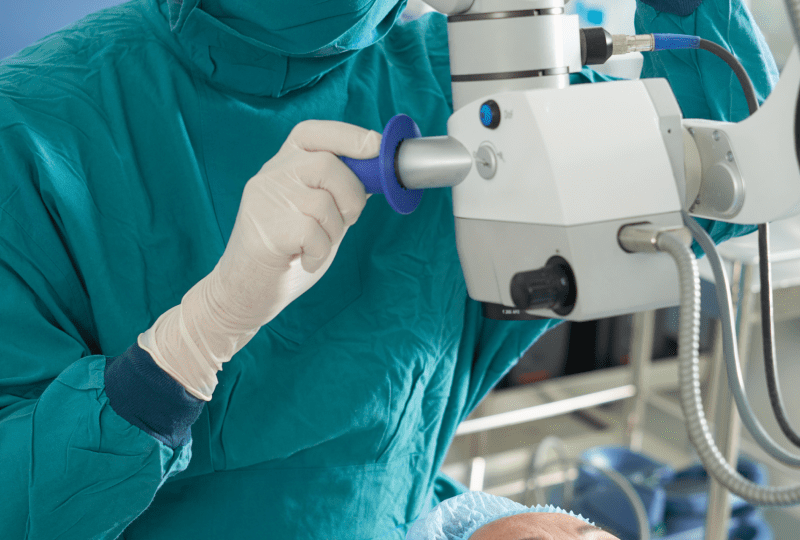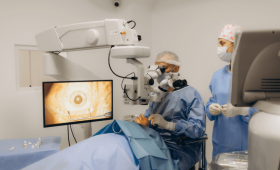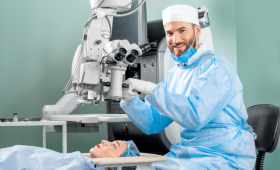What Is The Average Cost Of LASIK Eye Surgery In Istanbul?
The average cost of LASIK eye surgery in Istanbul is generally 50% to 70% lower than prices in Western Europe and America. This cost varies depending on the type of laser applied (Femto-LASIK, i-LASIK, or standard LASIK) suitable for the patient’s eye structure. These costs, usually offered as package prices, include detailed pre-operative examinations, the surgery, the consumables used, and the first post-operative control sessions. This economic pricing stems from the value of the Turkish Lira against foreign currencies and low operational expenses, making Istanbul a unique center for eye treatment.
What Services Are Included In The Surgery Cost?
Reliable eye centers in Istanbul generally offer comprehensive packages for international patients. These packages fundamentally include the surgery itself, comprehensive pre-operative eye examination and tests, single-use materials to be used in the surgery, necessary medications and eye drops for the first week post-surgery. Health tourism-focused institutions may also include airport transfers and accommodation in addition to these basic services. Patients should clarify which services are included in the price when receiving a quote, which facilitates their treatment planning process in Istanbul.
Why Are LASIK Prices More Affordable Than In Europe And The UK?
The main reasons why LASIK prices in Istanbul are so much more affordable than in Europe and the UK are Turkey’s low general operational and labour costs and the strong exchange rate difference. High case volume and clinics’ efforts to increase international competitiveness allow unit costs to decrease. Although the laser technologies and devices used in the surgery are global standard, the low personnel, rent, and general operating expenses of the clinics enable patients to receive the same quality of service at much lower budgets, which increases Istanbul’s appeal.
How Does Inflation Affect Eye Surgery Prices?
Although general inflation in Turkey may slightly increase local costs in the health sector, laser eye surgery prices remain extremely advantageous for patients coming from abroad. This is because a large part of the surgery costs is calculated over foreign currency, and the exchange rate difference provides the patient with a continuous purchasing power advantage. Most clinics in Istanbul strive to keep their prices competitive relative to the international market to maintain international competition. Patients are advised to complete their appointments and payment procedures early to protect against potential price increases.
Which Laser Technologies Are More Expensive?
Among the laser technologies used in eye centers in Istanbul, Femto-LASIK (bladeless laser) and Wavefront (personalized treatment) techniques are more expensive compared to standard LASIK or PRK methods. Femto-LASIK requires higher technology because it uses a femtosecond laser instead of a mechanical blade (microkeratome) during the flap creation stage. Wavefront technology involves more laboratory and planning processes because it maps the unique defects in each patient’s eye and personalizes the treatment plan. These advanced techniques promise safer and more precise results, which may be worth the cost difference.
Is The Price Of Single Eye Surgery Half That Of Two Eyes?
No, the price of single eye surgery is generally not half the total cost of two eyes. The cost of preparing the laser device, calibration, and sterilizing the operating room is the same for a single eye. Pre-operative examinations and consumables used also have similar costs to surgery performed on two eyes. Therefore, the cost of single eye surgery is usually only slightly lower than the total cost of two eye surgeries. Most patients prefer to have both eyes operated on at the same time for both cost-effectiveness and to ensure balance between the eyes.
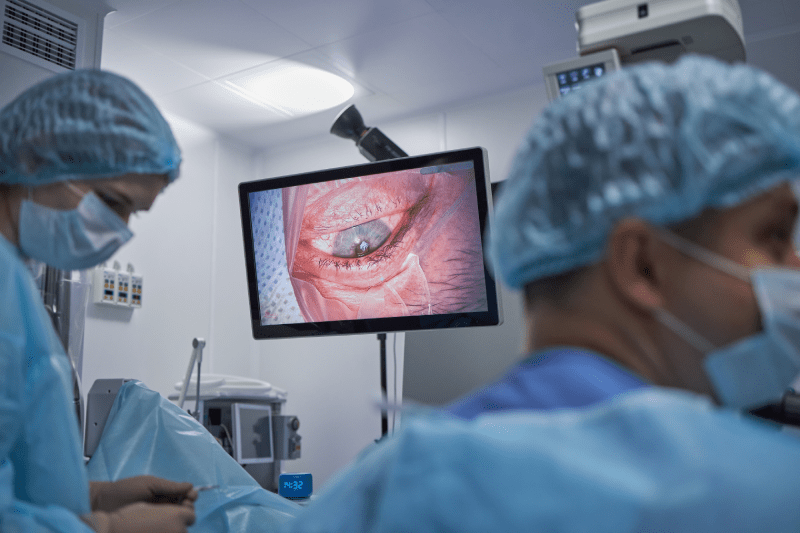
Can Intraocular Lens Treatment Be Included In The LASIK Price?
No, LASIK prices generally cover laser surgery based on the principle of reshaping the cornea. Intraocular Lens (IOL) treatment is a completely different surgical procedure applied especially to patients with very high degrees or unsuitable corneal structure for LASIK, and its cost is much higher than LASIK. IOL treatment requires separate pricing due to the quality of the lens, the complexity of the surgical technique, and the hospital environment required. The patient must confirm which treatment is suitable for them during the pre-examination.
Are Pre-Examination And Tests Included In The Surgery Price?
Institutional eye centers in Istanbul and clinics working with Cure Holiday generally include the costs of comprehensive pre-operative examination and tests in the package price. These tests provide critical data about the patient’s corneal thickness, eye degree, eye pressure, and general eye health, and are vital for safely planning the surgery. However, some low-priced offers may exclude this important pre-examination fee. The patient must ensure that these examinations are fully included in the price before starting treatment.
Is A Second Laser Intervention (Touch-Up) Charged?
A second laser intervention (touch-up) is rarely needed after a successful LASIK surgery. Reliable clinics in Istanbul usually offer a free touch-up guarantee for minor degree corrections if deemed necessary within one year after the surgery. This guarantee shows the physician’s confidence in their success. However, the duration and scope of the touch-up guarantee (which usually covers small defects remaining after the success of the first surgery) must be determined by contract; interventions after this period may be subject to a fee.
Are Medications And Eye Drops Used Post-Surgery Included In The Package?
Yes, most comprehensive packages in Istanbul include antibiotic and cortisone eye drops and painkillers that the patient must use during the post-operative recovery process in the price. These medications are critical for preventing the risk of post-operative infection and accelerating healing. This service, which eliminates the need for patients to search for medication in Turkish pharmacies, is indispensable for a comfortable recovery process. Patients must use the drops strictly according to the physician’s instructions.
Which Is The Most Preferred LASIK Method In Istanbul?
The most preferred method by patients in eye centers in Istanbul is Femto-LASIK (bladeless laser) technology. This method uses a femtosecond laser instead of a mechanical blade (microkeratome) used in the traditional LASIK flap creation stage. This allows the flap to be created more precisely, thinner, and more regularly, which reduces the risk of dryness and complication rates post-surgery. Expert physicians in Istanbul combine this advanced technology with high case volume to offer the safest and most comfortable experience.
Up To Which Degrees Can LASIK Surgery Be Applied?
LASIK surgery can generally be applied up to -10 diopters for myopia, +4 or +5 diopters for hyperopia, and -5 diopters for astigmatism. However, the applicability of the surgery depends not only on the degree but also on corneal thickness, eye pressure, and the condition of eye dryness. Physicians in Istanbul determine whether the specified degrees can be safely treated by performing a detailed corneal mapping during the pre-operative examination. In patients with high degrees, methods like Femto-LASIK or PRK may generally be preferred.
What Is i-LASIK (Wavefront) And Who Is It Suitable For?
i-LASIK is one of the most advanced laser methods that uses the personalized treatment principles of Wavefront technology. This technology maps the unique optical aberrations (high-order aberrations) in the patient’s eye with millimetric precision and personalizes the treatment not just according to the degree, but according to all surface features of the eye. i-LASIK is suitable especially for patients with complaints such as night vision problems, light scattering (halos), and glare. This personalized treatment is offered to patients seeking the highest level of vision quality in Istanbul.
Is Pain Or Discomfort Felt During The Surgery?
No, the patient absolutely does not feel any pain or ache during LASIK eye surgery. Before the surgery, the eyes are brought under local anesthesia with numbing drops. The surgery itself usually takes only 5 to 10 minutes for each eye. The patient may only notice the light emitted by the laser device and a slight pressure felt around the eye. Mild stinging or watering may occur in the first few hours post-surgery, but this condition is easily controlled with prescribed painkillers and quickly passes.
What Is The Risk Of Eye Dryness After Surgery?
Temporary eye dryness is a common and expected condition in the first months after surgery due to the temporary effect on nerve endings in the cornea caused by the surgical incision. However, the use of bladeless techniques like Femto-LASIK in Istanbul clinics significantly reduces the risk and severity of eye dryness compared to traditional LASIK. Physicians prescribe intensive moisturizing eye drops to patients to manage this temporary condition. An eye dryness test is performed before surgery, and alternative methods like PRK may be recommended for at-risk patients.
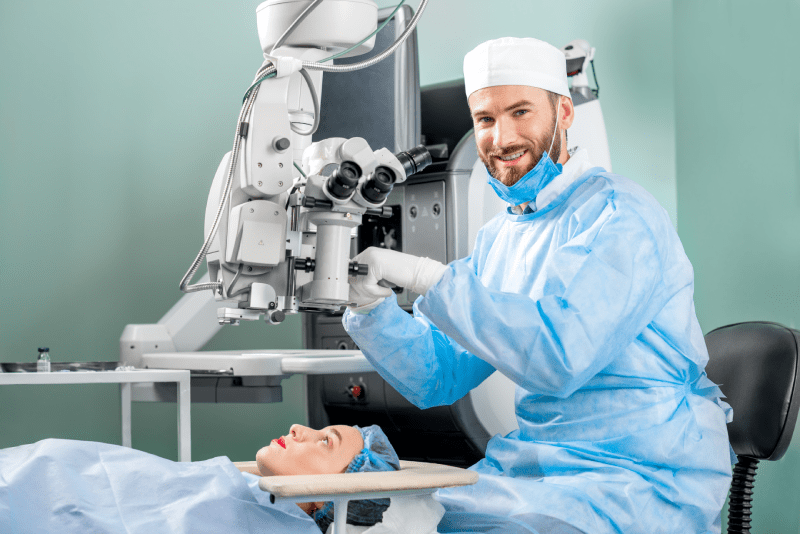
How Is The Eyelid Kept Open During The Surgery?
The eyelid is kept open during the surgery using a special eyelid holder (speculum). This device prevents the patient from blinking or involuntarily closing their eye. Although this is one of the most concerning issues for patients, the presence of the speculum does not cause discomfort thanks to the numbing drops. The devices constantly track the patient’s eye movements during laser application to ensure the laser beam finds the correct spot even if the patient moves their eye, maximizing surgical safety.
Is Cataract Surgery An Obstacle To LASIK Treatment?
Cataract is the clouding of the eye’s natural lens and is an obstacle to LASIK surgery. This is because cataract is a disease that affects vision quality, and the benefit LASIK would achieve by correcting the cornea would be limited. In patients with cataracts, vision correction is generally provided by placing an artificial lens inside the eye during cataract surgery. This treatment both eliminates the cataract and corrects existing refractive errors (myopia, hyperopia). The physician determines the most appropriate treatment path in Istanbul by considering both conditions.
Can LASIK Surgery Be Performed At An Advanced Age?
The basic requirement for LASIK surgery is that eye degrees have been stable for at least one year and the cornea is healthy. Although there is no strict upper age limit, patients are generally directed to Presbyopia Laser or multifocal intraocular lens treatments due to near vision problems (presbyopia) that occur around the age of 40 and cause the need for reading glasses. Whether the surgery can be performed at an advanced age is evaluated by the expert physician in Istanbul based on the patient’s overall eye health and expected vision quality.
Which Specialists Should Be Preferred For The Best Eye Surgery In Istanbul?
To achieve the best LASIK result in Istanbul, specialists in Ophthalmology who are particularly specialized in Corneal and Refractive Surgery, have high case experience, and international training should be preferred. Successful LASIK depends not only on the device quality but also on the physician’s precision in flap creation and laser planning. Experts working in JCI-accredited hospitals and having performed hundreds of successful laser operations, guided by organizations like Cure Holiday, offer the most reliable option. This expertise is the fundamental guarantee of treatment in Istanbul.
What Accreditations Should The Clinic Have For The Surgery To Be Reliable?
When choosing a reliable eye center in Istanbul, it is vital for the clinic to have international JCI (Joint Commission International) accreditation or the T.R. Ministry of Health Health Tourism Authorization Certificate. JCI accreditation indicates that the clinic meets the highest global standards in patient safety, sterilization protocols, and treatment processes. These accreditations are the most concrete proof of the clinic’s quality for international patients. The hospital where the surgery is performed should also have these accreditations, doubling the safety of the treatment.
Is The LASIK Experience Of Physicians In Istanbul Different From That In Europe?
Yes, the LASIK experience of laser eye surgeons in Istanbul is more extensive and diverse than many of their colleagues in Europe due to high case volume. Turkey being a health tourism hub allows physicians to perform hundreds of laser surgeries annually. This high practical experience increases the physicians’ ability to manage rare complications and safely treat even patients with challenging corneal structures. This experience factor is one of the biggest advantages of receiving treatment in Istanbul and maximizes the success rate.

How Are The Up-To-Dateness And Quality Of Laser Devices Checked?
Leading eye centers in Istanbul generally use the latest generation Femto-LASIK and Excimer laser devices from world-leading brands (Carl Zeiss, Abbott/AMO, Alcon). The up-to-dateness and quality of these devices are regularly audited by international organizations, and device maintenance is performed by authorized services. Patients can confirm this quality by asking which brand and model of laser device will be used during the pre-operative consultation. The clinic’s investment in technology directly demonstrates the level of reliability of the service offered.
Is Laser Vision Correction A Permanent Procedure?
Yes, LASIK and other laser vision correction procedures aim to permanently correct the patient’s existing refractive error (myopia, hyperopia, astigmatism). The part of the cornea reshaped during the surgery maintains this shape permanently. However, near vision problems (presbyopia) that occur around the age of 40 due to aging after the surgery do not mean the surgery has failed; this is the natural aging process of the eye, and additional procedures may be required to correct this condition. The permanence of the surgery depends on the patient’s eye degree being stable before the surgery.
How Are Post-Operative Check-Ups Performed And By Whom?
Post-operative LASIK check-ups are generally performed at your clinic in Istanbul on the first day, first week, first month, and sixth month after the surgery. These checks are vital for ensuring the flap has adhered properly, and for checking eye pressure and visual acuity. The first day check-up is mandatory and critical for international patients. Subsequent long-term checks can also be followed up online or in collaboration with an ophthalmologist in the patient’s home country, organized by Cure Holiday.
Who Is Not Suitable For LASIK Surgery?
People who are not suitable for LASIK surgery are generally those who are under 18 years old and whose eye degrees have not stabilized. Additionally, those with very thin corneas, advanced eye dryness, those with corneal diseases like keratoconus, those with systemic diseases like uncontrolled diabetes, and pregnant/nursing women are not suitable candidates for LASIK. Expert physicians in Istanbul identify these risk factors through detailed tests before surgery and recommend alternative treatments like PRK or Intraocular Lens to unsuitable patients.
How Long Should The Stay In Istanbul Be?
Although LASIK eye surgery is generally a quick procedure, patients are recommended to stay in Istanbul for an average of 3 to 4 days for a safe recovery process. During this period, the patient completes the detailed pre-operative examination, the surgery itself, and the mandatory first post-operative check-up (usually the next day). Spending the first 24 hours under the supervision of a physician is very important to minimize the risk of early complications. This short stay can be combined with a weekend getaway in Istanbul.
When Does The Return To Normal Life Occur After Surgery?
The return to normal life after surgery is quite fast thanks to the LASIK method. Most patients begin to see clearly the day after the surgery, and visual acuity increases rapidly. Returning to work or study is usually possible within 1 to 2 days. However, heavy sports that strain the eyes and eye makeup should be avoided for the first week. The ban on swimming in pools and the sea usually lasts for the first 2 weeks. Physicians in Istanbul provide detailed instructions that allow the patient to quickly return to their daily activities.
When Can Driving Be Resumed After Surgery?
The time to resume driving after surgery depends on the patient’s visual acuity meeting legal limits and the physician’s approval. Most patients achieve the clarity to drive one or two days after the surgery, but driving should be avoided until night vision stabilizes. After the final approval given by the physician in Istanbul during the first check-up appointment, the patient can safely start driving. Wearing sunglasses for the first few weeks is important to protect the eyes from bright light.
Are Travel And Accommodation Services Included In The Package In Istanbul?
Health tourism organizations like Cure Holiday generally include VIP airport transfers and accommodation in 4 or 5-star hotels near the clinic in the surgery package for the comfort of international patients. These services enable the patient to focus on their treatment and completely eliminate logistical stress in Istanbul. Thanks to these included services, the patient’s treatment process in Istanbul proceeds with the comfort of a holiday and in a budget-friendly manner.
Is Traveling To Istanbul For Surgery Risky?
No, traveling to Istanbul for surgery is not risky; on the contrary, it is extremely planned and safe. Clinics and hospitals in Istanbul are focused on international patient admission, and the entire process (welcome, transfer, treatment) is managed professionally. Centers with JCI accreditation implement the highest hygiene and safety standards. The treatment process in Istanbul maintains the quality of service the patient would receive in a private hospital in their own country while offering a cost advantage.
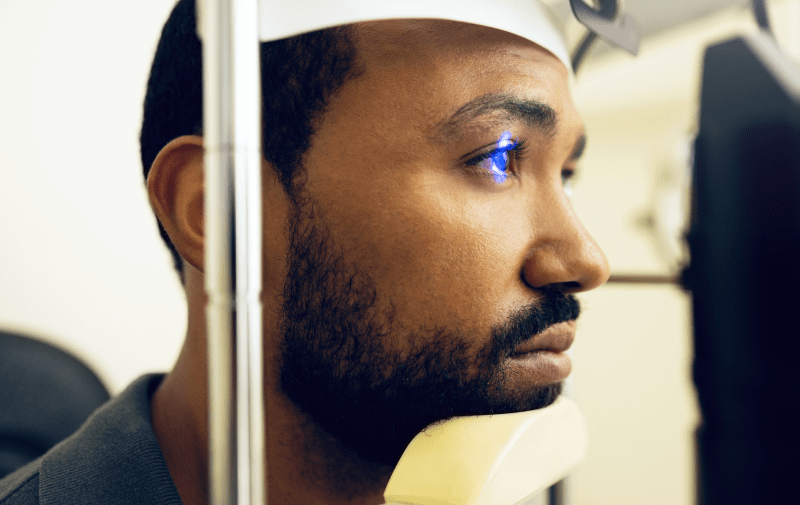
Which Airport Is Closer To Eye Centers In Istanbul?
There are two main airports for international patients in Istanbul: Istanbul Airport (IST) and Sabiha Gökçen Airport (SAW). Istanbul Airport (IST) is generally more suitable for reaching centers on the European side (Şişli, Maslak, Etiler), while Sabiha Gökçen (SAW) is preferred for centers on the Asian side. The VIP transfer services offered by Cure Holiday ensure your seamless journey to your clinic or hotel, regardless of which airport you land at.
How Long Does The Mild Stinging Sensation Last After Surgery?
The mild stinging, burning, and watering sensation that occurs in the eyes after surgery generally appears within the first 4 to 6 hours post-operation and subsides within a few hours on its own. This temporary discomfort is part of the nerve ending healing process and is easily managed with the moisturizing drops and painkillers recommended by the doctor. Most patients report that this stinging sensation is completely gone when they wake up the day after the surgery.
When Is Eye Makeup And Lens Use Safe After Surgery?
To prevent the risk of post-operative infection and ensure the cornea heals completely, eye makeup (especially mascara and eyeliner) and contact lens use should be avoided for at least 1 week (preferably 2 weeks). This period is necessary for the surgical flap to fully settle in place and for the eye surface to regenerate itself. Rubbing the eyes should also be strictly avoided. The physician will individually determine these periods based on the healing rate of the eyes during the first check-up appointment.
Is The Use Of Glasses Or Sunglasses Required After Surgery?
The use of sunglasses to protect from ultraviolet rays and dust is absolutely mandatory immediately after the surgery. Sunglasses should be worn not only outdoors but also indoors for the first few days. There is no need to use regular glasses after the surgery as visual acuity has improved. However, upon the doctor’s advice, non-prescription protective glasses may be used for a few weeks to rest the eyes while working in front of a computer.
How Are Long-Term Follow-Up And Check-Ups Performed In Istanbul?
Long-term follow-up after LASIK surgery is important for maintaining the quality of the treatment. After the first month and sixth-month check-ups post-surgery, patients generally return to their home country. The clinic in Istanbul continues to follow up with these patients through remote consultation services or by collaborating with an ophthalmologist in the patient’s country of residence, organized by Cure Holiday. These institutions manage all coordination and reminders to ensure that the patient’s long-term follow-ups are not interrupted.
